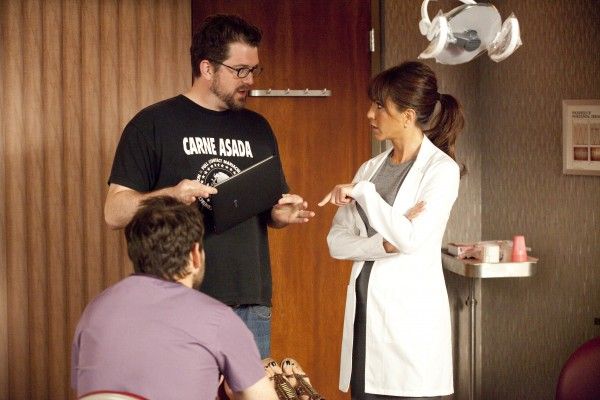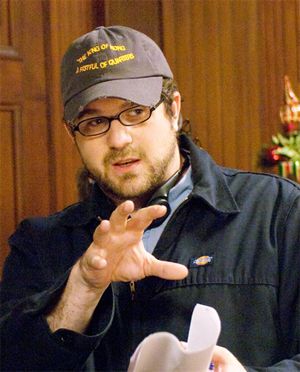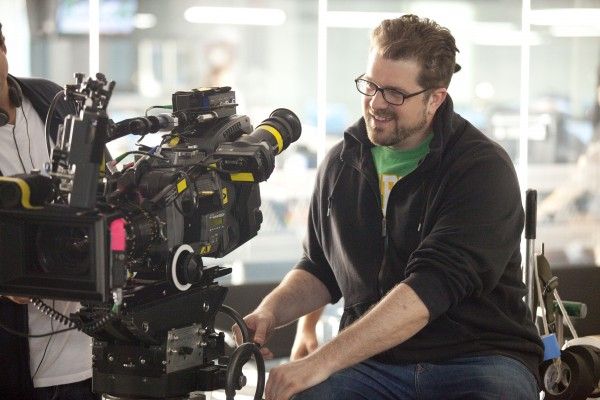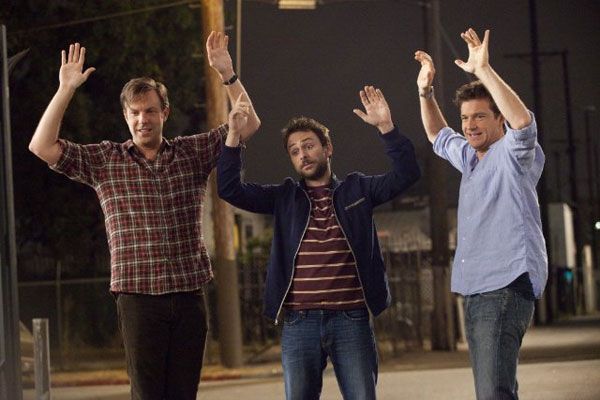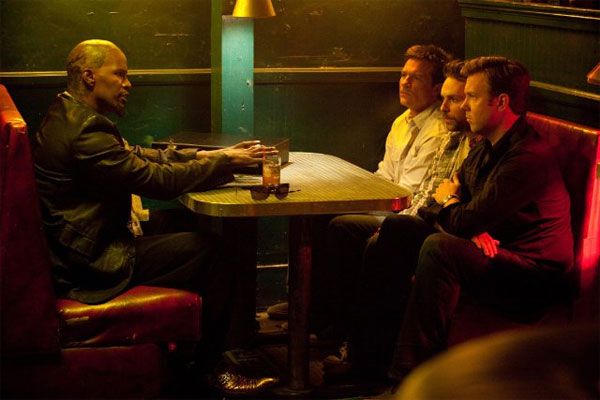In the raunchy and hilarious comedy Horrible Bosses, three friends conspire to murder the awful bosses that make their lives a living hell. Management candidate Nick (Jason Bateman) is doing everything he can to please his twisted supervisor Harken (Kevin Spacey) because he thinks it will earn him a well-deserved promotion. Dental assistant Dale (Charlie Day) has been fighting off the X-rated advances of Dr. Julia Harris (Jennifer Aniston), much to her dismay. And accountant Kurt (Jason Sudeikis) now has to answer to his company’s corrupt new owner, Pellit (Colin Farrell), who is on a fast-track to run the company into the ground. After some advice from a hustling ex-con by the name of Motherfucker Jones (Jamie Foxx), the guys come up with a plan, although ill-conceived, to permanently rid the world of their respective employers.
While at the New York press day, director Seth Gordon spoke to Collider for this exclusive phone interview, in which he talked about the universal appeal of the script, matching up the actors who would play the employees and their horrible bosses, walking a tonal tightrope to keep the film grounded, the improv that led to much of the comedy gold not making it into the film itself but likely ending up on the DVD/Blu-ray, and what it’s like to see the TV version of a hard-R film. He also talked about getting to work on his remake of the 1983 film WarGames, and his wish to still make the King of Kong narrative feature. Check out what he had to say after the jump.
How did you come to direct Horrible Bosses?
SETH GORDON: This doc I did, King of Kong, was purchased by New Line and we were trying to find other scripts to do. They sent me this one because they had developed it to a place they were happy with, and I read it and literally cried laughing because it was so funny. The role that [Jennifer] Aniston eventually played was the one that really got me. For some reason, I just pictured her as the one. It’s not like she says that kind of stuff ever, but I just somehow thought it would be electric if she were to. So, I chased the movie, I pitched them the ideas, and they felt like-minded about the way we’d approach it, and that was it.
What was it about the humor that you were able to really key in with?
GORDON: Well, I’ve certainly had my share of workplace frustrations, either being in a situation a lot like [Jason] Bateman’s character, where you have this overbearing, pitifully superior fucker, or just where there’s something about the workplace you wish were different, but there’s really nothing you can do about it. There was just something I thought was so universal about that. All my friends could relate to the idea, and that meant I really wanted to dig in and be a part of it.
What made these three guys the ultimate trio of actors for the film, and how challenging was it to pair each of those actors up with bosses that they could really go toe-to-toe with?
GORDON: It became like a Matrix problem to solve, in the math sense. I knew that whoever was playing against [Jennifer] Aniston, or that female boss, was going to have to be plausibly innocent enough that they would be overwhelmed by her and overpowered. If it were [Jason] Sudeikis with her, I just don’t buy it. He would just want to have sex, and that’s it. There’s something about his energy as an actor that you just don’t buy that. With Charlie [Day], however, I totally buy it. He’s in a committed relationship. He loves his wife. So, her advances, while flattering, are really dangerous and scary. That kind of thinking went into each of the pairs.
Part of what I proposed to New Line was that we would try to appeal to marquee names that aren’t typically associated with this kind of comedy, and we would schedule the film in a way that they wouldn’t have to be around very long, so that we could get these great people involved for a brief period of time. And, that was also true for the Motherfucker Jones character. Because we took that approach, it was like, “Yeah, Colin Farrell can be there for a week. It’s only a week? Amazing! Let’s do it!” That kind of conversation is a lot easier than, “Can you do it for 50 days?,” which is normally what they have to contend with.
Because the subject matter of a murder plot can be perceived as pretty dark, was it important to find that perfect balance between the story and the humor, and also have these guys be so inept and incompetent, in following through with their plan?
GORDON: Absolutely! It was a tonal tightrope walk to make the film grounded enough in the beginning that you relate to the suffering that they each endure, but also fun enough that we never take the possibility that they could actually commit the crime all that seriously. The other factor was to have somebody in the middle – eventually [Jason] Bateman – who was the reasonable one, so the others could be crazy and bananas. I wanted to let Bateman be the rational one, who’s not fully committed to this crazy plan, so that the other guys could be nuts, and I think that strategy really worked. It was actually Bateman himself who helped dial in the exact moments where he felt that he had committed too much, too soon, so we really tailored it to him. Every actor is going to be different in what they bring to playing it, and he has an incredible left-brain sense of how he can modulate what he does. That was an awesome problem to solve with him. That was really fun.
When you’re working with such great actors who are so naturally funny, do you have to be open to whatever they throw at you while you’re shooting?
GORDON: For sure. If I had attempted to rule this set with an iron fist, it would have blown up in my face. These guys are writers, in their own right, and incredible comedians. [Jason] Bateman is actually a great director, too. So, if I approach that environment being a control freak then what’s going to end up happening is frustration on set because the stuff they bring is so dynamic that every take is a little bit different. That’s a great thing. I feel like my own background in improv and doing documentaries makes me really comfortable with a situation where you’re letting things unfold and you don’t have to be a jerk, stomping his feet, trying to get his way on everything. It’s just the wrong paradigm. The right paradigm is that you come to play and discover stuff ‘cause that’s where the gold is.
Since you presumably have a lot of stuff that didn’t make it into the film, do you have plans for special features and extras on the DVD/Blu-ray release?
GORDON: Oh, yeah. Our DVD is going to be amazing because there’s so much gold that didn’t fit in the final film. Hopefully, there’s going to be fans that are going to want to dig into all of that.
In doing a movie like this that it very definitely a hard-R rating, does it make you cringe to see edited versions for TV and airplanes?
GORDON: I don’t know how they’re going to do it. We had to record “Motherlover Jones.” But, they did it for The Hangover, so theoretically they can do it without comprising the film too much. Honestly, I think a lot of the people who watch it in that environment saw it in the regular way, so they remember, I hope. I don’t know. That’s the way I make myself feel better about it.
Don’t you think it will change so much of the concept and story to edit the film like that?
GORDON: Totally! They told me they were doing a TV version, and I was like, “What?! Really?! How?! Okay.” They’re actually going to present that to me in a couple weeks, and I’m fascinated with what they’re going to do.
Is the remake of WarGames the thing that you’re going to be focusing on next?
GORDON: That’s a big project, and I’m going to be focusing on it immediately, but not exclusively. It will take a long time ‘cause we have to write it and then cast it. It’s a lot of steps. I’m hoping to get that going, and also sneak a smaller film, in between.
What is it about that film that appeals to you and made you feel like it was something that you could put your own stamp on?
GORDON: I love the original. I’m a bit of a hacker fanatic, and know a fair bit about that industry and cyber crime and cyber warfare. I have a real point-of-view on the material and how things have changed. And also, I think the politics of the world have changed in really fascinating ways since 1983. There’s no longer a monolithic evil empire somewhere, spreading a different philosophy of life. That doesn’t exist. It’s a much more complicated, nuanced, political world we’re in, and I think that actually makes for a more interesting plot to tell. Frankly, cyber attack is a lot more real.
As a filmmaker who, up until now, has gotten to make films without the attention being on them until they’re done, is it daunting to have so much attention focused on you for a project, pretty much as soon as you sign on the dotted line?
GORDON: No, I think it’s fine. I prepared myself mentally already for those who love the original so much that they’ll never like what we do, no matter what it is. That’s just a given. And then, beyond that, I just think it’s about trusting our instincts and making the best film we possibly can. I don’t find that daunting. I find it a cool challenge, honestly.
Are you still hoping to go ahead with the King of Kong narrative film, at some point?
GORDON: A script literally came in two weeks ago and it’s honestly great. It’s an interesting problem because it’s such a good script that I’d be compelled to make it, even if I hadn’t made the original. Really, the studio has got an important decision to make. Since I first started at New Line on that, their slate and the number of movies they make each year has changed a lot, so I don’t know if they still have space for it anymore, but I think the script is really good.
You’ve been involved with so many documentaries in your career. How do you go about determining the subjects that you want to focus on?
GORDON: It’s character, above all, and then, if there’s an event or a timeline that is an obstacle to something that character wants, that’s the primary criteria. I’ve been trying to support younger filmmakers, in making documentaries. There’s one called Make Believe that just came out, and another one called Undefeated that will come out in the Fall. In those cases, I’m supporting them and I’m the producer trying to help them, so it’s really up to them, but those films have those attributes as well.
As a director, do you prefer the pace of directing for television, or do you prefer to have the slower pace of film?
GORDON: Film, for sure. In film, you get to take your time and make it right. In TV, it’s all about the schedule. The train is moving and you sometimes just don’t have time to make things right, which is painful ‘cause you know it could be done better and you just have no choice.
In regard to Horrible Bosses, are you surprised with how many people have thought about killing a boss, and who seem to be living out their wish fulfillment, in seeing this movie?
GORDON: I’m actually not surprised, at all. I know so many of my friends have just hated some bosses in their lives, and I think we’ve all, in the working world, had some sort of situation that’s really taxed us greatly, where we’ve wanted to no longer be answering to that person. I’m surprised that people are admitting it as much as they are.
Because you have so many well-known actors playing against type in the film, was there anyone that surprised you the most, in their willingness to do anything for a laugh?
GORDON: I think Colin [Farrell] did. Jennifer [Aniston] is getting all this attention, and she’s phenomenal, don’t get me wrong. But, Colin is truly like we’ve never seen him. I think he became a completely different guy in his energy and posture and presence, and I think he’s going to blow people away. People haven’t seen him do this stuff, and he’s such a devilish maniac. He really got into it, and I enjoyed working with him so much.

